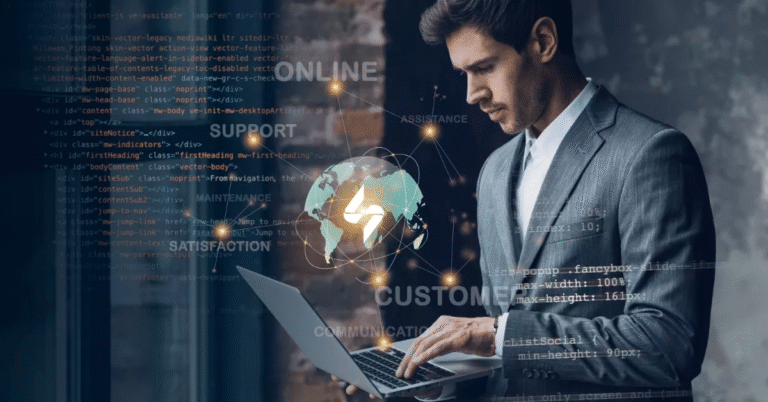AI-Powered Next-Gen Software for Automation: Transforming the Future of Work
Automation has long been a buzzword in the tech industry, promising to make tasks faster, easier, and less prone to human error. But today, thanks to the rise of Artificial Intelligence (AI), we’re entering a new era: the era of AI-powered next-generation software for automation. This powerful combination is not just about speeding up repetitive jobs anymore. It’s about creating smart systems that can learn, adapt, and even make decisions — fundamentally changing how businesses operate and how people work.
In this article, we’ll explore what AI-powered next-gen software for automation means, how it works, its benefits, real-world applications, and what the future might hold. If you’re curious about the future of technology or want to understand how this innovation can impact your business or career, read on!
What Is AI-Powered Next-Gen Software for Automation?
Let’s break down the phrase:
- AI-powered means software or systems that use Artificial Intelligence technologies like machine learning, natural language processing, and computer vision to mimic human intelligence.
- Next-gen (next generation) indicates the newest, most advanced version of something.
- Software for automation refers to programs designed to automatically perform tasks without constant human input.
Putting it all together, AI-powered next-gen software for automation is the latest breed of smart software that automates complex tasks by understanding, learning, and improving from data — much like a human would, but faster and at scale.
How Does It Work?
Traditional automation software follows strict, pre-set rules to perform repetitive tasks, such as sorting emails or scheduling appointments. These systems are efficient but limited. They can’t handle unexpected situations or improve themselves without manual reprogramming.
AI-powered automation software, however, uses AI algorithms to:
- Learn from Data: It analyzes large sets of information to detect patterns and make predictions.
- Understand Context: Through techniques like natural language processing (NLP), it can comprehend human language and respond appropriately.
- Adapt and Improve: Using machine learning, it continuously learns from new data to optimize performance.
- Make Decisions: Some advanced systems can make autonomous decisions based on analysis, without human intervention.
For example, an AI-powered software in customer service might automatically read and understand customer emails, decide on the priority, and either respond with a solution or escalate the issue to a human agent.
Why Is AI-Powered Automation Important?
Here are some of the main reasons why this technology matters:
1. Efficiency at Scale
AI-driven automation can handle thousands of tasks simultaneously without tiring or making mistakes, vastly increasing productivity.
2. Cost Savings
By automating routine tasks, businesses reduce labor costs and minimize human errors that can be costly to fix.
3. Improved Accuracy
AI systems are highly accurate in data processing and decision-making, which leads to better outcomes.
4. Faster Decision Making
AI can analyze data and make decisions in real time, helping companies respond quickly to changing market conditions or customer needs.
5. Innovation and Growth
Freeing employees from mundane tasks lets them focus on creativity and innovation, driving business growth.
Real-World Applications of AI-Powered Automation
Many industries are already benefiting from this technology. Here are a few examples:
1. Customer Service
AI chatbots can handle thousands of customer inquiries 24/7, offering instant responses and routing complex problems to human agents. This improves customer satisfaction and reduces wait times.
2. Finance and Banking
AI automates fraud detection by analyzing transaction patterns, speeds up loan approvals through automated document processing, and manages risk with predictive analytics.
3. Healthcare
AI-powered automation helps in diagnosing diseases by analyzing medical images, managing patient records, and automating administrative work so doctors can spend more time with patients.
4. Manufacturing
Smart robots and AI-driven machines automate assembly lines, optimize supply chains, and predict maintenance needs to reduce downtime.
5. Marketing
AI tools automate personalized email campaigns, analyze customer behavior, and optimize ad spending in real time to maximize ROI.
What Challenges Does AI-Powered Automation Face?
While the benefits are clear, there are challenges too:
- Data Privacy and Security: Handling sensitive information responsibly is critical.
- Job Displacement Concerns: Automation may reduce certain jobs, so workforce reskilling is essential.
- Complexity: Developing and maintaining AI systems requires skilled professionals and investment.
- Bias in AI: AI can inherit biases from training data, which may lead to unfair decisions.
- Integration: Existing legacy systems might be difficult to integrate with next-gen AI automation.
The Future of AI-Powered Next-Gen Automation
Looking ahead, AI-powered automation will only become smarter and more embedded in our daily lives and workplaces. Here’s what to expect:
- Hyperautomation: Combining AI, robotic process automation (RPA), and analytics for end-to-end automation of complex workflows.
- Human-AI Collaboration: AI assisting humans rather than replacing them, enhancing decision-making and creativity.
- Industry-Specific Solutions: Tailored AI automation software to meet the unique needs of different sectors.
- Ethical AI: Growing focus on creating transparent, fair, and accountable AI systems.
- AI Everywhere: From small businesses to large enterprises, AI automation will be a standard tool to improve competitiveness.
Conclusion
AI-powered next-gen software for automation represents a huge leap forward from traditional automation tools. By harnessing AI’s ability to learn, adapt, and make decisions, this new generation of software is transforming how businesses operate, improving efficiency, reducing costs, and unlocking innovation.
Whether you’re a business leader looking to gain a competitive edge or someone interested in how technology is reshaping our world, understanding AI-powered automation is key. As it evolves, embracing this technology thoughtfully will be crucial to maximizing its benefits while addressing the challenges it brings.
Frequently Asked Questions (FAQs)
1. What is the difference between traditional automation and AI-powered automation?
Traditional automation follows fixed rules to perform repetitive tasks, while AI-powered automation can learn from data, understand context, and improve over time, enabling it to handle more complex and variable tasks.
2. Can AI-powered automation replace human jobs?
While AI automation can replace some routine jobs, it also creates new roles focused on managing, developing, and working alongside AI. The key is reskilling workers to adapt to the changing job landscape.
3. Is AI-powered automation only for large companies?
No, businesses of all sizes can benefit. Many AI automation tools are now accessible and affordable for small and medium-sized enterprises, helping them improve efficiency and compete.
4. How secure is AI automation when handling sensitive data?
Security depends on how the software is designed and implemented. Leading AI automation solutions include robust encryption, access controls, and compliance with data protection regulations to safeguard sensitive information.5. What industries benefit most from AI-powered next-gen automation?
While many sectors benefit, industries like finance, healthcare, manufacturing, retail, and customer service have seen significant improvements due to the adoption of AI-powered automation.


